Award-Winning Chicago Personal Injury Lawyer - Securing Justice
for Illinois Injury Victims - Over $450 Million Recovered
At Rosenfeld Injury Lawyers, our Chicago class action lawyer team is dedicated to protecting the rights of individuals who have been harmed by large corporations, unsafe products, or negligent practices. We know that when powerful defendants cause widespread harm, it can feel overwhelming for a single person to take them on.
That’s where we come in, combining the voices of many into a single, powerful case. Our experience in high-stakes class action litigation has helped Chicago residents and families recover millions of dollars in settlements and verdicts, and we’re here to make sure our clients receive the justice they deserve.
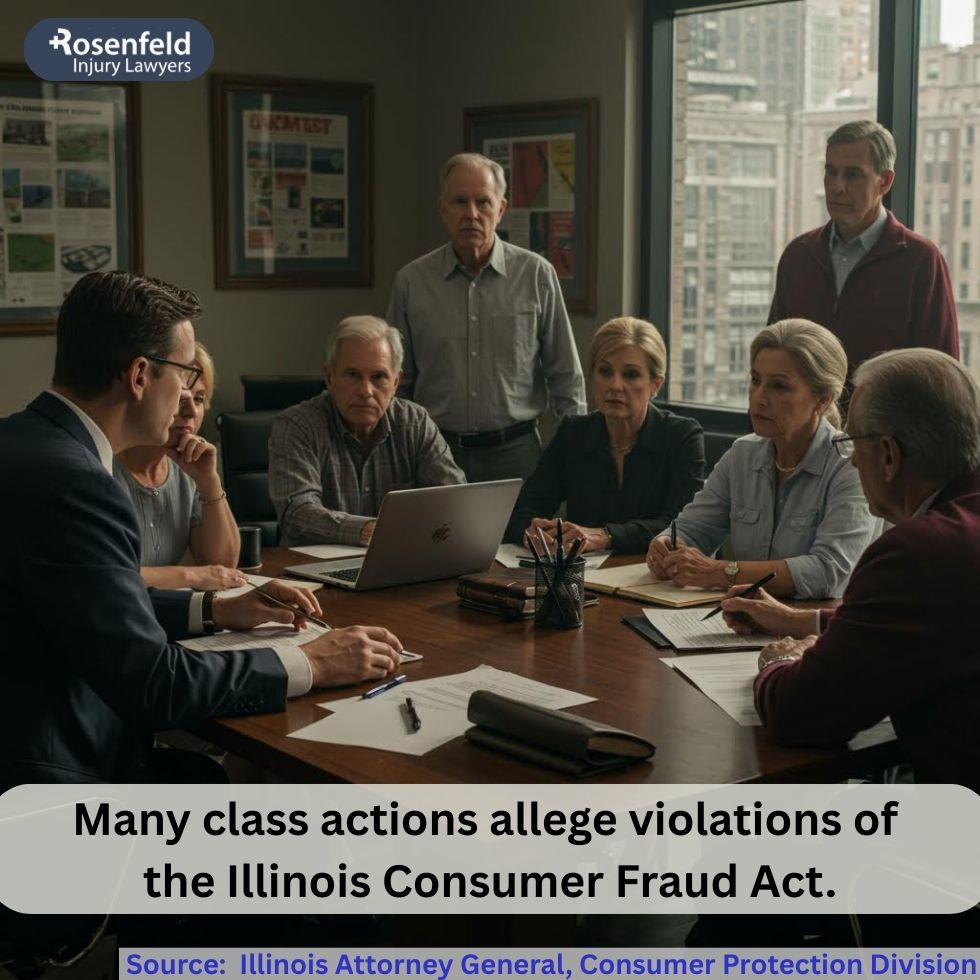
When you’re taking on a class action lawsuit, you need an advocate with the resources, experience, and determination to go up against corporate legal teams. Rosenfeld Injury Lawyers is recognized among the top-rated Chicago class action attorneys for our proven track record and client-focused approach.
We bring together the skills needed to investigate complex cases, coordinate among multiple plaintiffs, and manage the extensive evidence required in these lawsuits. Our law firm has been recognized by respected organizations like Super Lawyers and The National Trial Lawyers, and our results speak for themselves — over $490 million recovered for our clients.
A class action lawsuit is a legal action where a small group of representative parties — often called named plaintiffs — bring claims on behalf of a significant number of people who have suffered similar harm. This structure allows courts to efficiently handle cases that affect large groups without requiring each person to file an individual lawsuit.
To qualify as a class action in Chicago and under Illinois law, the following requirements must be met:
Advantages of a class action suit include:
At Rosenfeld Injury Lawyers, we represent Chicago residents in a wide range of class action lawsuits. Many of these cases involve situations where a company’s negligence or misconduct harmed not just one person, but hundreds or thousands. Our role is to unite those voices and pursue justice for everyone affected.
When companies mislead consumers about the safety of a product or service, the results can be devastating. We’ve represented clients in cases where deceptive marketing or hidden defects caused injuries, from unsafe household goods to mislabeled food products.
Our skilled class action attorneys handle cases involving faulty appliances, electronics, and other consumer goods that caused harm. These cases often involve poor design, manufacturing defects, or a failure to provide adequate warnings to consumers.
Our firm has taken on drug manufacturers and medical device companies whose products caused serious side effects, organ damage, or even death. In these cases, the companies often knew about the risks but failed to warn patients and doctors.
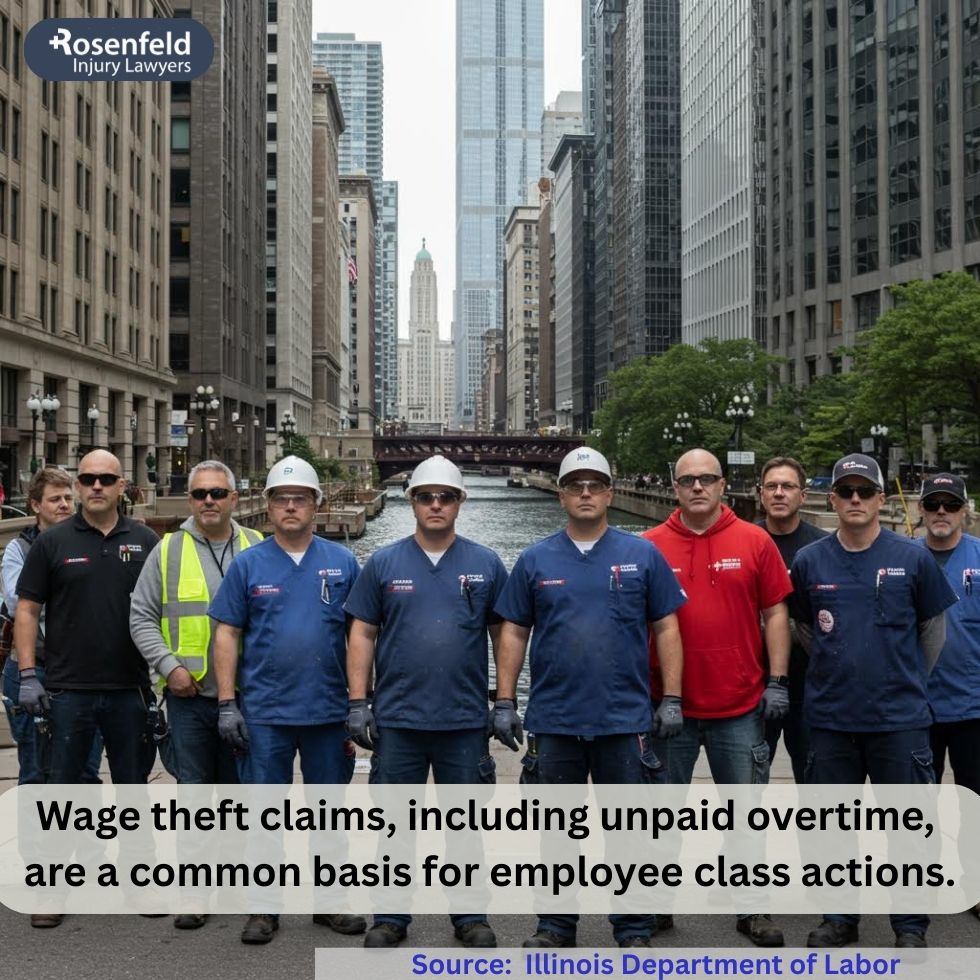
From chemical spills to unsafe air quality, environmental hazards can affect entire communities. We’ve represented groups exposed to toxic substances that caused respiratory illnesses, cancer, and other long-term health problems.
While our focus is on personal injury–related class actions, many class actions in Chicago and across the U.S. involve other legal issues. These can include violations of fair debt collection practices, unfair business practices, or breaches of consumer protection laws intended to protect consumers.
Class actions are also commonly filed when individuals are similarly situated in cases involving widespread data breaches or financial misconduct, as well as situations where people have suffered injuries from unsafe or fraudulent services.
In our experience handling class action lawsuits in Chicago, the harm our clients suffer can range from purely financial losses to life-changing physical injuries. While every case is unique, certain types of injuries come up again and again in these large-scale claims.
When defective products are involved, the injuries can be physical and severe. We’ve represented clients with burns, fractures, and lacerations caused by unsafe consumer goods. Environmental contamination cases sometimes involve chronic illnesses or disabilities linked to prolonged exposure to hazardous materials.
Dangerous drugs or chemicals can lead to poisoning, organ damage, respiratory illness, or even cancer. Medical-related class actions often reveal a pattern of health complications from dangerous pharmaceuticals or faulty medical devices.
The answer depends on the type of case, the evidence, and the harm suffered, but generally, damages fall into three main categories.
Economic damages cover direct financial losses. This can include refunds, replacement costs, lost wages, and medical expenses if a defective product, drug, or environmental hazard caused injury or illness. In some cases, these damages also include the cost of ongoing medical care or rehabilitation.
Non-economic damages come into play when clients experience harm beyond their bank accounts. If a product defect or dangerous chemical caused pain, emotional distress, or reduced quality of life, those losses can be included in a settlement or verdict. While these damages are harder to measure in dollars, they are just as real and deserve recognition.
Punitive damages are reserved for the most extreme situations, such as when a company’s conduct was reckless, willful, or showed complete disregard for public safety. These damages aren’t just about compensating victims; they’re meant to send a clear message to corporations that such behavior won’t be tolerated in Chicago or anywhere else.
Without a class action, many individuals in these cases would receive minimal compensation — or nothing at all — because the cost of pursuing an individual lawsuit might exceed the value of their claim.
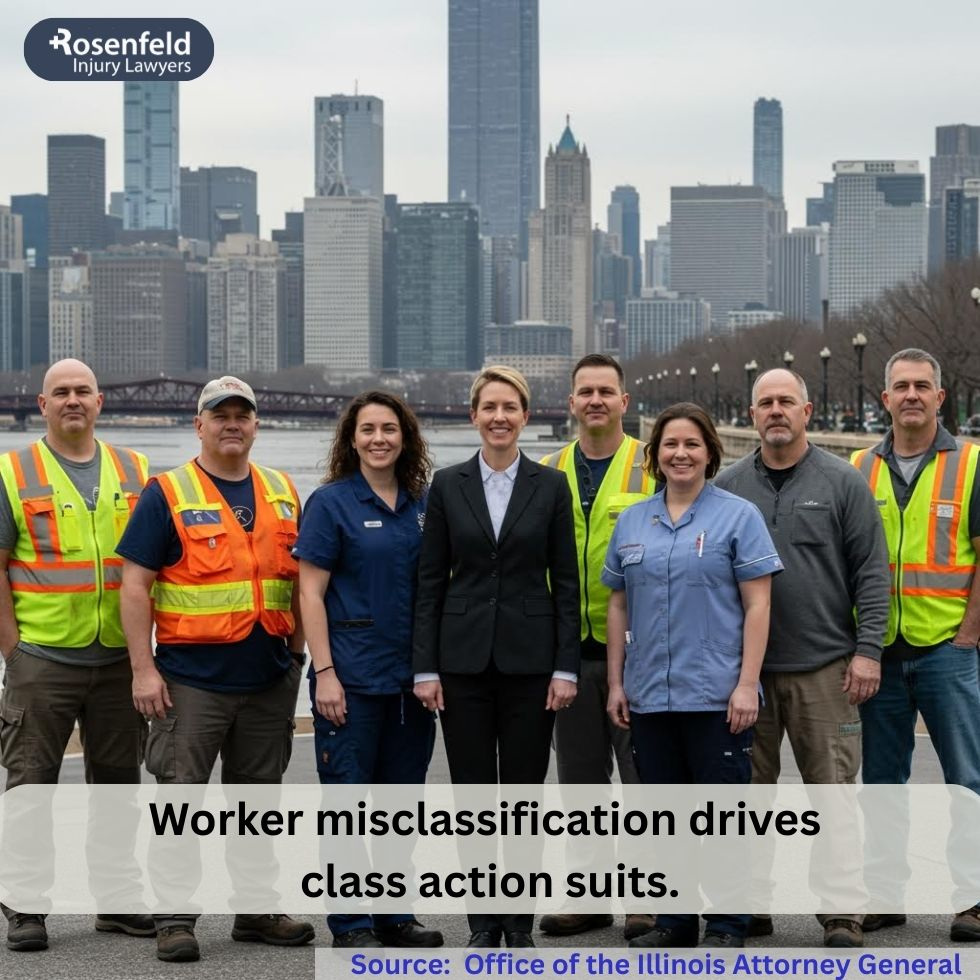
Class action lawsuit payouts range from as low as $50,000 to as high as $546 million. The median settlement amount is around $8.2 million, while the average payout is significantly higher at $74.9 million.
These numbers are not guarantees but give a rough average of what’s possible in successful class action cases. Factors that can increase the value include the severity of harm, the number of people affected, clear evidence of corporate misconduct, and the complexity of the case.
For example, large environmental contamination cases or major product defect claims can lead to multi-million-dollar outcomes because they often involve widespread harm and significant proof of negligence.
Nationally, high-profile class actions — such as those against General Motors over defective ignition switches — have demonstrated the power of uniting injured consumers to hold major corporations accountable.
One major Chicago-area class action targeted a national retailer over the delivery and installation of freestanding and slide-in electric and gas ranges. Plaintiffs alleged the company failed to install anti-tip brackets — a safety feature designed to prevent tipping accidents — despite knowing about the risk for decades. The class action lawsuit involved claims of breach of warranty and consumer fraud. Before trial, the retailer agreed to a settlement exceeding $527 million, which included providing safety brackets and installations for all affected class members nationwide.
Another significant Illinois case focused on environmental contamination in Naplate, a small town near Ottawa. Approximately 250 families alleged that a nearby glass manufacturing plant released arsenic into the groundwater over many years. The case involved extensive environmental testing and expert evidence. Before a jury could decide on federal environmental claims, the parties reached a $2 million settlement, with a portion allocated to ensure the community’s drinking water remained free from arsenic.
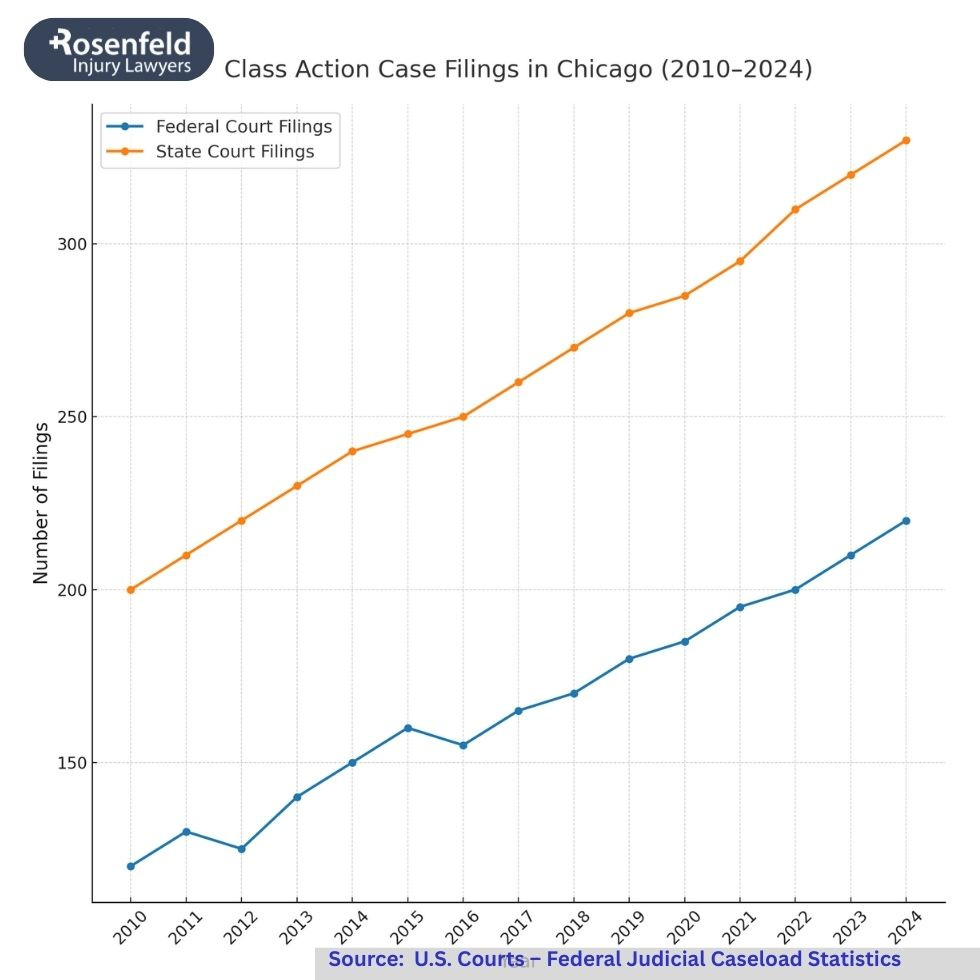
Class action cases are some of the most complex matters in civil litigation. They often involve multiple plaintiffs from different locations, large corporate defendants with deep resources, and thousands of pages of evidence to review.
In Chicago, these cases can be filed in the Northern District of Illinois or the Cook County Circuit Court, both of which have strict procedural requirements for certifying a class, notifying members, and managing discovery.
Large companies often hire top-tier defense firms to challenge every element of a class action, from the number of plaintiffs to whether their claims are similar enough to proceed together. They may use delay tactics, contest expert evidence, or attempt early settlements that undervalue the claims.
An experienced Chicago class action lawyer can anticipate these strategies, gather the evidence needed to prove common issues, and coordinate with other plaintiffs to build a stronger case. In larger cases, the court may appoint lead counsel to coordinate filings, manage discovery, and ensure consistent representation for all class members.
Still, having the right legal team also ensures that negotiations or trial arguments are handled effectively, increasing the likelihood of a fair outcome. Finally, an experienced attorney can determine whether a class action is the best course of action or whether another strategy, such as multidistrict litigation, is more appropriate.
Class actions in Illinois are governed by both state and federal law. At the state level, 735 ILCS 5/2-801 sets the prerequisites for class certification, such as proving that the group is large enough to make individual lawsuits impractical, that there are common legal or factual issues, and that the representative plaintiffs can adequately protect the class’s interests.
On the federal side, Rule 23 of the Federal Rules of Civil Procedure provides the framework for certifying, managing, and resolving class actions filed in federal court. The Class Action Fairness Act of 2005 (CAFA) (28 U.S.C. §§ 1332(d), 1453, 1711–1715) expands federal jurisdiction over larger, multi-state class actions and requires specific notice procedures.
These same federal standards apply to the Roblox class action lawsuit, in which families nationwide are seeking collective relief for harm caused by the company’s alleged failure to protect minors from online grooming and exploitation.
Illinois case law, such as Smith v. Illinois Central R. Co., 860 N.E.2d 332 (Ill. App. Ct. 2006), also guides how courts apply these rules in practice.
In a personal injury class action, liability often falls on the entity whose conduct or product harmed multiple people in the same way.
In Chicago and across Illinois, potential defendants can include large corporations that manufacture or distribute compromised products, pharmaceutical companies that release unsafe drugs or medical devices, employers who allow hazardous workplace conditions, financial institutions engaged in fraudulent practices, or even government agencies that fail to maintain safe public spaces.
In many cases, liability is shared. For example, a defective consumer product could involve the manufacturer, the distributor, and the retailer. By grouping similar claims together, a class action allows all affected individuals to hold every responsible party accountable in a single coordinated case.
Corporations rarely accept class action claims without a fight. Some of the most common defenses include:
Our firm’s approach to these defenses is proactive. We gather strong evidence early, use expert testimony to show patterns of harm, and structure the case so it meets both Illinois and federal class certification standards.
When dozens, hundreds, or even millions of people have been harmed by the same wrongful conduct, organizing that fight can be overwhelming. That’s where we step in. Our class action lawyers investigate the claims, gather evidence from every available source, and work with experts to prove the harm was widespread and preventable.
We coordinate with other plaintiffs, handle all filings in state or federal court — including in the Northern District of Illinois and Cook County Circuit Court — and negotiate aggressively with corporate defense teams. If the case needs to go to trial, we are fully prepared to present a compelling, evidence-backed case to the jury.
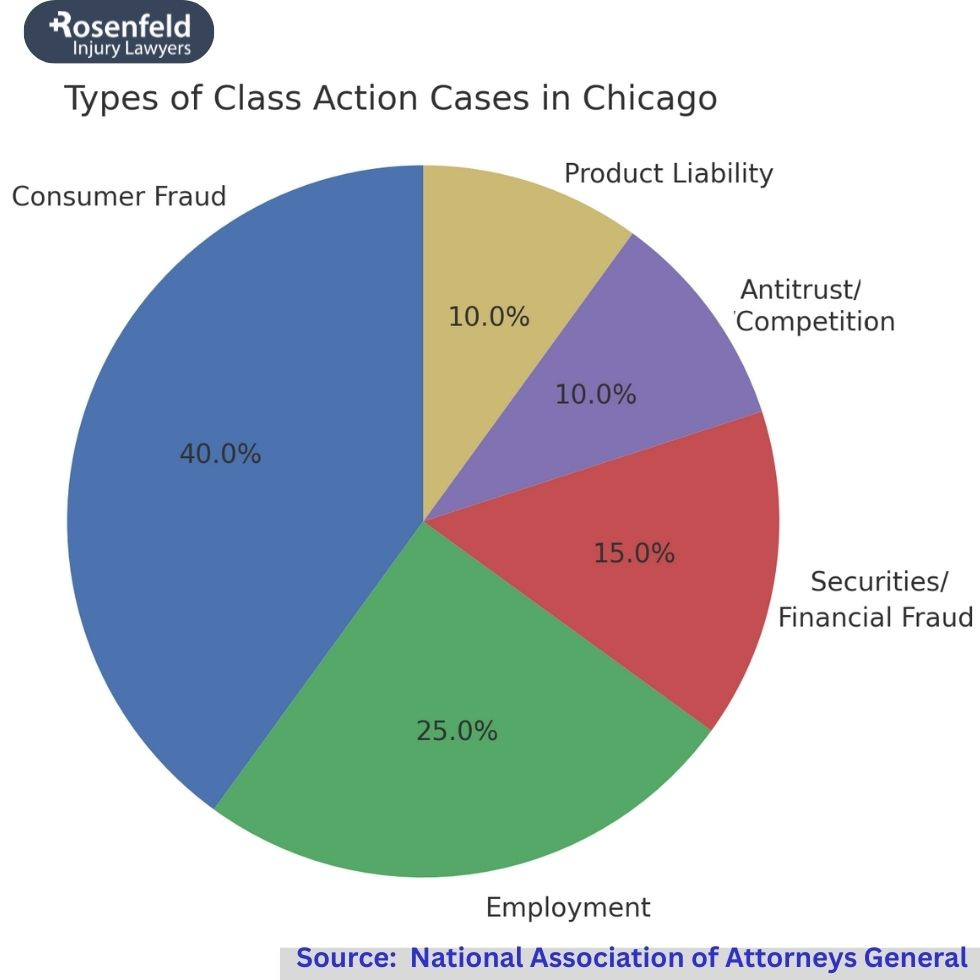
How do I know if my situation qualifies for a class action lawsuit?
We usually look for three main things: a large group of people affected, a common source of harm, and similar legal or factual issues for everyone in that group. If the harm is unique to you or very different from others, we may explore other avenues such as multidistrict litigation (MDL) or an individual case.
What role do whistleblowers play in class actions?
In certain types of class actions, particularly those involving fraud against the government or large-scale corporate misconduct, whistleblowers are crucial. These insiders often provide evidence that would otherwise be hidden, such as internal documents, emails, or testimony that reveals the scope of wrongdoing. In some cases, whistleblowers can be entitled to a financial award based on the recovery their information helps secure.
How much does it cost to hire a class action lawyer in Chicago?
With us, there are no upfront costs. We work on a contingency fee basis, which means our payment is tied to your success. If we don’t win or settle your case, you owe us nothing. This arrangement ensures that anyone, regardless of financial resources, can take on a major corporation or institution in court.
Can I join a class action that has already been filed?
Yes, in many cases you can. If the class is already certified by the court, you might automatically be included as a member if you meet the criteria defined in the certification order. In other cases, you may need to “opt in” by submitting a form or registering through the court-approved legal process.
What happens if I miss the opt-in or opt-out deadline?
If you fail to opt out by the deadline, you may lose the right to bring your own individual claim later. If you fail to opt in, you might be excluded from any settlement or judgment. That’s why it’s important to speak with a class action lawyer as soon as you receive notice of a case, so we can ensure your rights are preserved.
Are there downsides to joining a class action lawsuit?
While class actions are powerful tools, they do come with trade-offs. Because all claims are bundled together, the settlement or judgment is divided among all class members, so your share might be less than what you could potentially recover in a solo lawsuit. You also give up some control over case decisions, as the lead plaintiffs and their attorneys will make strategic calls for the group. However, going it alone against a powerful corporation can be extremely difficult and costly. For many people, the benefits of shared resources, reduced expenses, and a unified case outweigh the drawbacks.

If you believe you’ve been harmed by the same wrongful conduct that has affected others, don’t wait to take action. Our team of top-rated Chicago class action lawyers is ready to review your situation, explain your rights, and determine whether your claim can be part of a coordinated lawsuit.
Our Chicago personal injury lawyers work entirely on contingency, and you don’t pay us unless we win for you. Call us today or fill out our online contact form to schedule a free, no-obligation consultation at our Chicago office. Together, we can take on even the most powerful defendants and fight for the justice you deserve.
Our downtown office, near the Richard J. Daley Center, Dirkson United States Courthouse, and the Chicago Workers’ Compensation Commission, offers convenient access from Aurora, Joliet, and Waukegan via I-90, I-94, and I-290.
225 W Wacker Dr #1660
Chicago, IL 60606
Phone: (847) 835-8895
Toll Free: (888) 424-5757
We also serve clients from Chicago, Naperville, Schaumburg, Rockford and throughout Illinois.
All content undergoes thorough legal review by experienced attorneys, including Jonathan Rosenfeld. With 25 years of experience in personal injury law and over 100 years of combined legal expertise within our team, we ensure that every article is legally accurate, compliant, and reflects current legal standards.